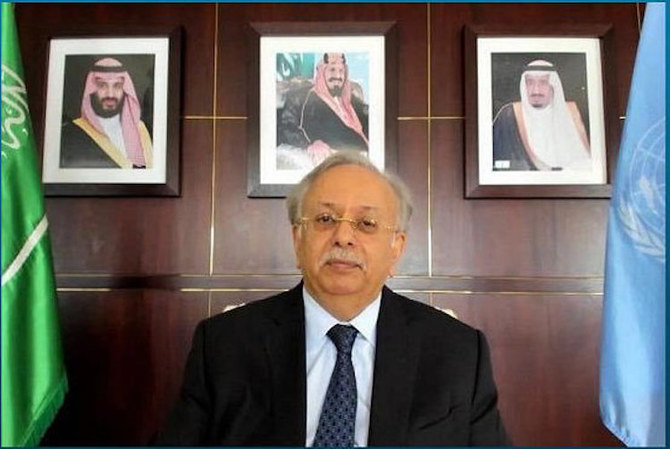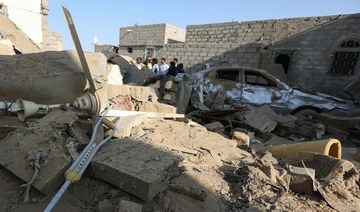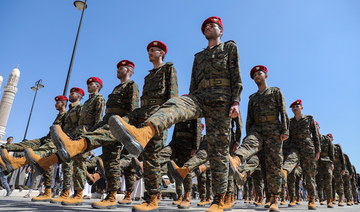NEW YORK: After an intense, two-hour meeting of the Security Council to discuss the crisis in Yemen, Abdallah Al-Mouallimi, Saudi Arabia’s permanent representative to the UN paused to reflect on the recent escalation of Houthi aggression in the country.
In an interview with Arab News on Thursday, Al-Mouallimi said that the surge in violence is a sign of “the state of desperation the Houthis find themselves in,” their apprehension about a shift in the mood of the international community against them, and their failures on the battlefield, where they have suffered “tremendous setbacks.”
Houthi hostilities have increased in many parts of the country, including an offensive launched against the last stronghold of the Yemeni government in oil-rich Marib. More than a million civilians have taken refuge there and the specter of yet another humanitarian catastrophe is looming. Meanwhile Houthi attacks on civilian targets in the Kingdom also continue.
This increase in violence comes less than a month after the Biden administration, which is intent on finding a solution to the situation in Yemen, moved into the White House.
Al-Mouallimi suggested that the Houthis sense a political and military breakthrough might therefore be in sight, and so have “desperately” resorted to “further sabotaging the peace process” by launching attacks that can only hamper the peace efforts of Martin Griffiths, the UN’s special envoy for Yemen, and preventing the flow of life-saving humanitarian aid.
“The (Trump) administration in its last few months was extremely preoccupied with other activities and concerns,” said Al-Mouallimi. “The (Biden) administration is determined to find a solution and it will very soon be clearly evident that finding a solution requires dealing with the Houthis in a manner that repulses their offensive and curtails their demands and ambitions.”
Richard Mills, the US deputy ambassador to the UN, told the Security Council on Thursday that the Biden administration is “committed to helping our partners defend themselves from attacks, such as the Houthi attack that struck a civilian airliner at Saudi Arabia’s Abha airport on Feb. 10, (and) will continue to enforce existing UN and US sanctions on certain members of Ansarallah (the official name for the Houthi movement), and we will closely monitor the group’s activities to assess whether additional actions are warranted.”
Al-Mouallimi said Saudi authorities are ready to work with the international community to identify other possible steps that could be taken “either on the battleground or on the political front.”
He added: “We stand ready to pursue all possible options and consider all other avenues that may be open to us, to the Americans, and to the international community.”
As he briefed the Security Council on Thursday, Griffiths condemned the recent spike in Houthi aggression and warned of the impending humanitarian disaster facing civilians in Marib. But he also called on the council to seize the opportunity to revitalize the political process.
Mark Lowcock, the UN’s humanitarian chief, warned the council that Yemen is rapidly heading toward “the worst famine the world has seen in decades” and that children are already “starving to death.”
“The world needs to take action now,” he added.
Switzerland and Sweden will co-host a high-level donor conference for Yemen in Geneva on March 1. Al-Mouallimi said he hopes the event will raise awareness of the gravity of the humanitarian crisis in the country, and called on the international community to put its money where its mouth is and be more generous with donations to help the people of Yemen.
“It is not good enough for anybody in the international community to comment on the gravity of the situation without actually backing that comment up with the appropriate contributions, donations and physical support that may be required.”
World Food Program Executive Director David Beasley, among others, has called on Gulf states to pick up the tab for the humanitarian response in Yemen, on the grounds that other rich nations are overstretched by their efforts to resolve other crises.
“They’re referring to COVID and the needs that came as a result of the COVID crisis,” said Al-Mouallimi. “Well, we are facing the same crisis and we are not hiding behind it to shy away from our responsibility.
“The reality is this: the humanitarian need in Yemen is a responsibility of the entire world community. If it comes to a division of labor, we (Saudis) have taken on our shoulders much more than our share of the burden in Yemen — and elsewhere, for that matter.
“It is easy enough to be generous with someone else’s money. It is easy enough to pass the buck to the Gulf states or other corners of the world. We say ‘the buck stops here.’ It stops here, as in with the Gulf States as well as with the world community at large.”
The Houthis are backed by the Iranians, yet there was no mention of the rogue regime in Tehran by anyone during Thursday’s Security Council briefing. This “policy of appeasement, of trying to find excuses for the Iranian regime is going to backfire in the world at large,” he warned.
“It has already backfired,” he added. “When the world closed its eyes for a while, Iran went ahead and developed their nuclear program to a level that became extremely alarming.
“And the same is happening right now both in terms of the nuclear program, which Iran is continuing to develop, as well as in terms of their support to the Houthis and their stranglehold on other areas, such as Lebanon and other places in the Middle East.
“The Iranians have no business interfering in Lebanon or Yemen or Syria or Iraq, or anywhere else for that matter. The world community needs to wise up to that fact and assign the burden of responsibility to where it should be assigned.”
Al-Mouallimi ended the interview on a positive note by noting that the history of crises across the world teaches us that escalation is often a sign of an approaching solution.
“In Arabic we say, ‘ichtaddi ya azmatu, tanfariji:’ for a crisis to be resolved, people tend to up the ante with their positions (in an attempt) to achieve tactical advantages to improve their prospective position in any negotiated deal that may be forthcoming,” he said. “So based on that, I am optimistic that we will ultimately be able to reach a comprehensive solution in Yemen.
“We all know that the Yemeni situation can only be resolved politically, through negotiations and compromise and understanding by (all) Yemenis that … they have a common fate and they need to work together to find a reasonable conclusion to the difficulties and the differences in Yemen.”




























